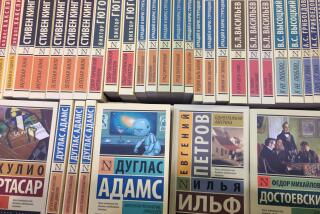REPORTER’S NOTEBOOK : So What Do You Call the X.S.S.R.? ‘Here’ Proves Popular With Baker
- Share via
BRUSSELS — So, what do you call it anyway?
As Secretary of State James A. Baker III whipped through five republics of the disintegrating Soviet Union this week, one of the most irksome problems was deciding how to refer to the country.
Naming the pieces is easy. Russia is Russia; Ukraine is Ukraine. But what about the whole? Russian President Boris N. Yeltsin likes Commonwealth of Independent States. But officials of the collapsing central government still favor the Soviet Union label.
Baker avoided taking sides by making sure he never called it anything.
For instance, in a Wednesday evening press conference in Kiev, Baker was asked his opinion on the future of Mikhail S. Gorbachev, who still holds the post of president of the Soviet Union.
“That is clearly a question for people here--not for people in the United States--to determine,” Baker said. “That is a matter involving the political processes over here and not in our country.”
“Here” was a word Baker used a lot on his trip. Where is here? He didn’t say.
Stepping into the void, traveling reporters and a few irreverent officials tried to devise their own names.
One favorite was ACNE, an acronym for Assn. of Countries With No Economy. OK, you skip over the W, but you get the idea.
Another suggestion was X.S.S.R.
If the commonwealth, now consisting of Russia, Ukraine and Belarus, grows to nine this weekend at a meeting in Alma-Ata, Kazakhstan, it will probably get a formal name. Kazakh officials are pushing for some variation of Commonwealth of Euro-Asian Independent States. But that may take some time to get used to.
One official reason for Baker’s decision to whip through four republics in two days after completing a day and a half of talks in Moscow was to acquaint the secretary of state with the non-Russian republics, and them with him. But Baker did not see much more than airports, highways between airports and government meeting rooms, and the rooms themselves.
For instance, his stay in Ukraine was entirely after dark. The Baker party arrived in Kiev well after sunset Wednesday and left long before dawn Thursday to permit him to get to Brussels in time for the start of a meeting of North Atlantic Treaty Organization foreign ministers. He had a few daylight hours in the other three republics, but the schedule contained no time for sightseeing.
The 5:30 a.m. departure from the Intourist Hotel in Kiev posed an unanticipated difficulty for part of the traveling press corps.
About the time the 5 a.m. wake-up calls were going out, the electricity failed in one section of the hotel inhabited by reporters, leaving them to dress and search for their belongings in almost total darkness.
David Hoffman of the Washington Post, a computer buff, whipped out his battery-powered portable computer and dressed by the garish light of the pop-up screen. But reporters carrying older, liquid crystal display computers with no internal light source had to get by with cigarette lighters and borrowed flashlights.
Regardless of their irresistible urge to be separate countries, the republics of the collapsing Soviet Union still have one thing very much in common: The battered ruble is the official medium of exchange.
No one really knows what a ruble is worth. The Soviet government has established a variety of exchange rates, ranging from the official rate of just over 1.70 rubles to the dollar to the “tourist” rate that has reached 100 rubles to the dollar or more.
For visiting foreigners, like those in Baker’s party, this poses some interesting situations. For instance, the bills at most hotels frequented by foreigners can be paid only in hard currency. The bill is often stated in rubles but can be paid only in dollars, deutschemarks or with credit cards converted at the artificially low official rate.
But some hotels permit the use of ruble notes to pay for long-distance telephone calls. For one reporter covering Baker, this meant a 210.70 ruble hotel bill, which amounted to almost $125 for the night. But a 430-ruble charge for calls to the United States could be paid with tourist-rate rubles and cost about $5.
More to Read
Sign up for Essential California
The most important California stories and recommendations in your inbox every morning.
You may occasionally receive promotional content from the Los Angeles Times.













